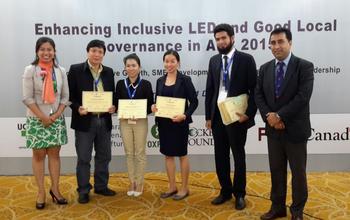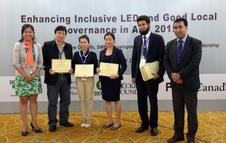
The role of local governments in local economic development (LED) is a critical question in the context of the ASEAN economic integration. Decentralization and market-oriented reforms offer local government, the private sector and local communities the opportunity to work together in new ways to improve the local economy. However, without an adequate framework to guide their actions, local government will find it difficult to navigate an increasingly complex environment.
Highlighting the importance of local governments’ role, UCLG ASPAC in collaboration with OXFAM, FCM, and Rockefeller Foundation, held the “Enhancing Inclusive LED and Good Local Governance in ASEAN Economic Community (AEC) 2015: Towards Inclusive Growth, SMEs Development, and Women’s Economic Leadership” on 9-11 December 2014 in Hanoi, Vietnam. The capacity building workshop aimed at preparing local governments to cope with upcoming opportunities and challenges in the region. An important dimension of this effort is to develop effective and reliable approaches and tools for local governments to measure the quality of economic governance in promoting and enhancing SME competitiveness, with a focus on enterprise development and women’s economic leadership.The need for engagement and partnership between diverse sectors and players to achieve sustainable LED will be underlined at the forum through the establishment of a regional LED network.
The training was attended by more than 70 participants from different backgrounds including local governments, the private sectors, civil society, and academia who deals with LED and SMEs development in South East Asia region. Linking with the regional agenda of ASEAN Economic Community 2015, 4 modules were discussed during the event which were the importance of SMEs and the implications of AEC to SMEs; the role of cities and communities in trade development; the elements of good governance to promote inclusive local economic development; and the dynamic decentralized cooperation for LED in ASEAN.
By conducting a 3-day intensive group discussion, the workshop delivered country action plans, which will be followed up as post training activity. Additionally, a working group on LED was also established in the form of ‘an alliance’, which will be embedded under the UCLG ASPAC’s working group of Asia-Pacific Local Economy Network.
The workshop was found beneficial since the content was relevant with the participants’ scope of work as well as with the upcoming opportunities and challenges of AEC 2015. A webinar is scheduled to be conducted on January 2015 to follow up the discussion and action plan which has been prepared during the event. UCLG ASPAC is keen to facilitate the established working group as well as post-training activities as part of its capacity building program.
Source: www.uclg-aspac.org











